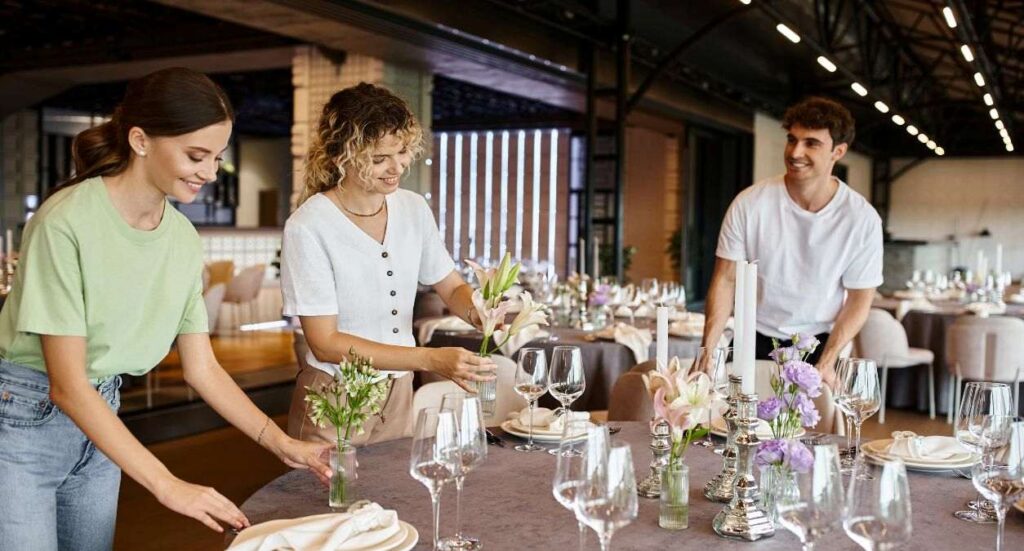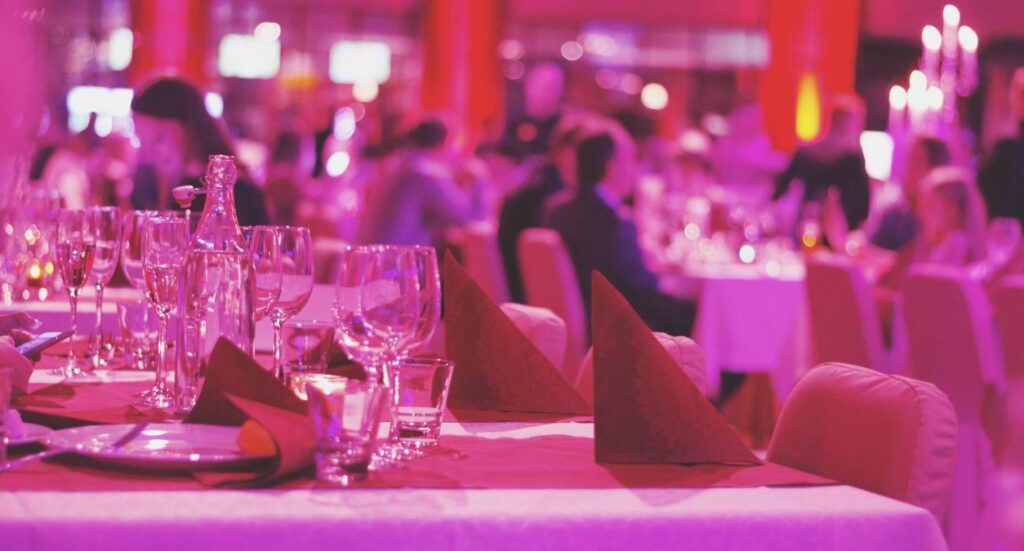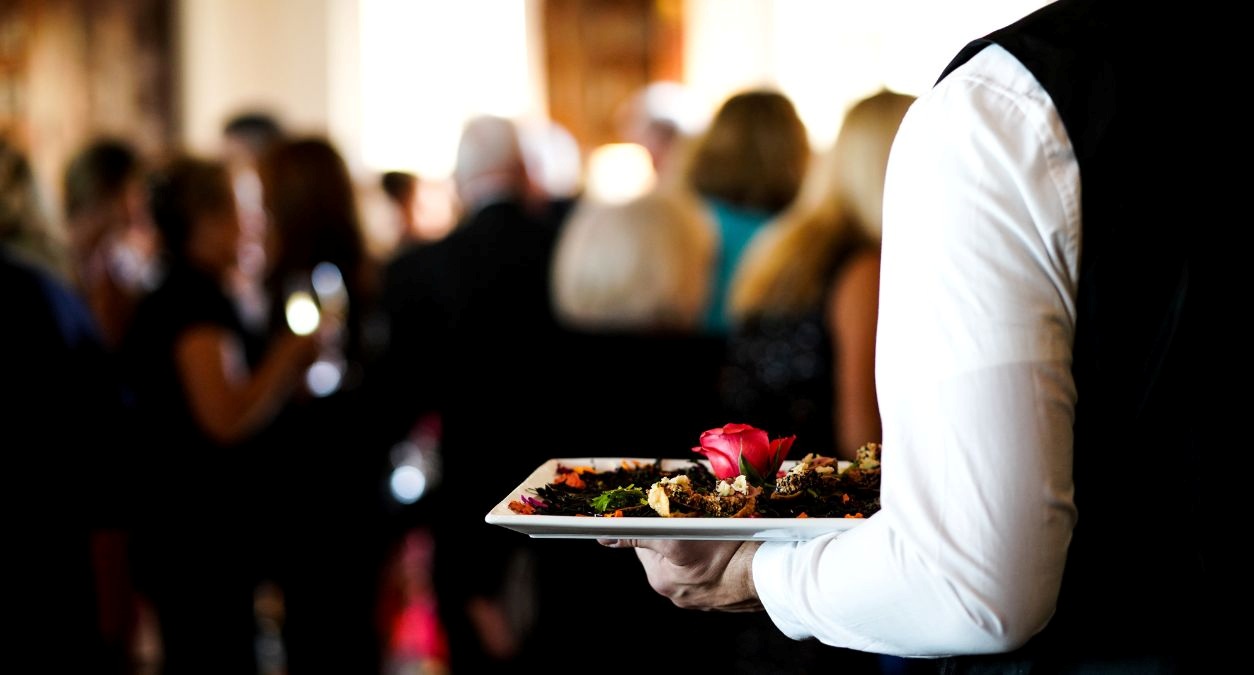Corporate hospitality is one of the most rewarding and lucrative areas of the events industry. From sporting fixtures and gala dinners to product launches and brand activations, businesses invest in hospitality to strengthen client relationships, celebrate successes, and boost brand visibility.
For freelancers, this presents a huge opportunity. Corporate events often rely on skilled, flexible professionals – from event managers and AV technicians to caterers, performers, and speakers – who can step in and deliver polished, professional services.
This guide explores what corporate hospitality is, the types of events it covers, and – most importantly – how freelancers can position themselves to take advantage of the opportunities it brings.
What is corporate hospitality?
Corporate hospitality refers to experiences that businesses provide for clients, partners, or employees with the goal of strengthening relationships and building brand value.
Why it matters to freelancers
Unlike private celebrations, corporate events are ROI-driven and often come with bigger budgets and repeat potential. Companies want events that reflect professionalism and deliver results – which means they are willing to pay for specialist talent.
Key benefits of this sector for freelancers
- Regular demand: businesses host multiple hospitality events across the year.
- Strong day rates: corporate budgets often exceed private event spending.
- Networking potential: every gig is a chance to impress decision-makers and open doors.
Types of corporate hospitality
If you’re working – or aiming to work – in this sector, knowing which types of events are popular and where the highest-value freelance opportunities lie is a smart starting point. Corporate hospitality is broad, but some event formats consistently generate strong demand for freelance talent.
Sporting Events
Sporting fixtures are a staple of corporate hospitality, from VIP boxes at football matches to branded lounges at rugby or cricket matches.
- Freelance opportunities: brand ambassadors, hosts, front-of-house staff, AV technicians, photographers, entertainers, MCs.
- Why it’s lucrative: hospitality packages are often high-ticket, meaning clients are willing to pay for polished, professional freelancers to deliver a premium guest experience. Regular sporting seasons can also mean repeat bookings.
Conferences and exhibitions
These are education and networking-focused, often large in scale and logistically demanding.
- Freelance opportunities: event managers, facilitators, MCs, AV/tech crews, interpreters, photographers, videographers, registration staff.
- Why it’s lucrative: conferences can run for several days, offering longer contracts and strong day rates. They also often require a large freelance workforce, making this a consistent source of work.
Product launches and brand activations
One-off or temporary events designed to make an impact – often in creative, non-traditional venues.
- Freelance opportunities: event managers, promo staff, performers, creative designers, content creators, installation specialists.
- Why it’s lucrative: brands usually allocate big budgets to create a splash, which trickles down to freelance rates. These projects often need specialist skills, meaning freelancers who can bring creativity, or technical know-how can command higher fees.
Networking dinners and gala nights
High-profile, often black-tie events that combine prestige with entertainment.
- Freelance opportunities: caterers, serving staff, sommeliers, MCs, live bands, DJs, photographers, stage managers.
- Why it’s lucrative: these events are highly visible to decision-makers. While they may be shorter gigs, they often pay well due to the premium expectations of service – and they can lead to referrals if you impress the right people.
Team building and Incentives
Events designed to engage employees or reward top performers, ranging from activity days to corporate retreats abroad.
- Freelance opportunities: facilitators, trainers, outdoor activity leaders, travel coordinators, photographers, motivational speakers.
- Why it’s lucrative: incentive trips and retreats can last several days, sometimes overseas, covering travel and accommodation. Freelancers benefit not only from strong fees but also from unique experiences.
Hybrid and virtual events
Now a permanent fixture in corporate hospitality, allowing companies to extend their reach beyond physical attendees.
- Freelance opportunities: virtual event producers, AV technicians, moderators, content creators, live-streaming specialists.
- Why it’s lucrative: digital expertise is still in high demand, and those with technical skills or on-camera confidence can command premium rates. The scalability of virtual events means repeat and regular opportunities.
Roles that freelancers play in corporate hospitality

Freelancers form the backbone of many corporate hospitality events. While companies and agencies may set the vision, it’s freelance professionals who often make the delivery possible on the ground.
Freelancers contribute across a wide range of areas, including:
- Event managers – overseeing logistics and coordinating teams.
- AV technicians – handling sound, lighting, streaming, and production.
- Photographers & videographers – capturing content for marketing and PR.
- Performers & speakers – entertaining, inspiring, or educating audiences.
- Brand ambassadors & hosts – representing the company and welcoming guests.
- Front-of-house staff – ensuring guests feel looked after from start to finish.
The Reality: Rewards and Demands
Corporate hospitality can be highly lucrative for freelancers. Day rates are competitive, the work is varied, and successful delivery often leads to repeat bookings. But it also comes with challenges:
- Short notice – contracts are often confirmed close to the event date.
- High expectations – professionalism and precision are non-negotiable.
- Long hours – events can run late into the evening, with early set-ups.
- Constant adaptation – every project means new teams, venues, and dynamics.
Those who thrive in this space balance flexibility with professionalism, bringing not only their craft but also an understanding of corporate culture.
How to stand out as a freelancer

To turn opportunities into regular, reliable work, freelancers should focus on building credibility and visibility within the sector:
Build a corporate-ready profile
Present yourself professionally with a polished website, LinkedIn presence, or digital portfolio. Use business-friendly language and showcase testimonials or case studies.
Work with agencies and suppliers
Many freelancers find steady work via event agencies, production houses, and catering firms. Building strong relationships with these gatekeepers is essential.
Network smartly
Every event is a chance to impress. Treat each booking as a live audition – professionalism, communication, and thoughtful follow-ups often lead to future work.
Stay adaptable
Schedules and briefs can change quickly. Freelancers who remain calm, solution-focused, and willing to adapt are remembered (and rehired).
Invest in skills
Expanding your toolkit – whether through AV knowledge, stage confidence, multilingual skills, or specialist training – makes you more versatile and valuable to clients.
Corporate hospitality clients are often looking for more than just a service – they want a trusted partner who reflects their brand. Freelancers who combine skill with adaptability and professionalism quickly become indispensable.
Collaboration across the industry

In corporate hospitality, no freelancer works in isolation. Caterers, AV crews, performers, organisers, and front-of-house staff all need to pull together to deliver a seamless experience.
For freelancers, this means:
- Clear communication – checking in with organisers, asking the right questions, and keeping other suppliers informed.
- Professional relationships – being easy to work with makes you memorable not only to the client, but also to agencies and fellow freelancers who may recommend you for future work.
- Reputation building – in the corporate world, word-of-mouth is powerful. A single strong collaboration can lead to multiple referrals within a client’s network.
Your talent may get you booked once, but collaboration and professionalism are what secure repeat work.
Summary
Corporate hospitality isn’t just a growing part of the events industry – it’s one of the most promising avenues for freelancers to build consistent, rewarding careers. Companies want polished, professional events, and they rely heavily on freelance expertise to make that happen.
By understanding the bigger picture, tailoring your services to business objectives, and presenting yourself as adaptable and reliable, you can transform one-off bookings into ongoing relationships.
In short: corporate hospitality doesn’t just pay for your craft – it rewards freelancers who act like partners, align with business goals, and help create lasting experiences that reflect well on the client.
Get Event Insurance from Protectivity
*Disclaimer – This blog has been created as general information and should not be taken as advice. Make sure you have the correct level of insurance for your requirements and always review policy documentation. Information is factually accurate at the time of publishing but may have become out of date.
Last updated by

















